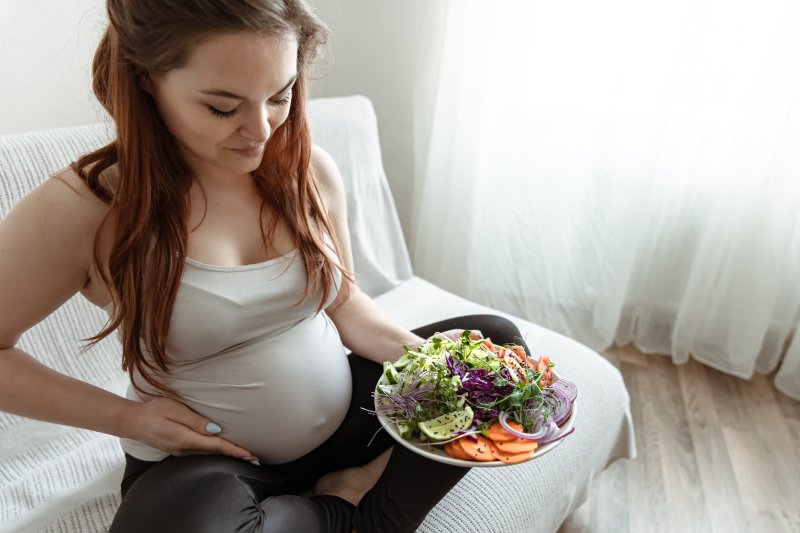
Pregnancy Nutrition - A Path to Healthy Pregnancy
Proper nutrition during pregnancy represents one of the key factors contributing to the health of both mother and baby. During pregnancy, the body undergoes numerous changes and has increased needs for certain nutrients. A balanced and varied diet, rich in all necessary nutrients, is not just a recommendation, but a necessity for optimal baby development and maintaining maternal health.
Key Nutrients in Pregnancy Nutrition
Pregnancy requires careful meal planning that provides all essential nutrients:
Proteins form the building blocks of cells and tissues, and are necessary for the development of organs, muscles, and placenta. Sources of quality proteins include lean meat, fish, eggs, dairy products, legumes, and nuts.
Healthy fats, especially omega-3 fatty acids, are crucial for baby’s brain and eye development. They are found in fish like salmon, walnuts, flaxseeds, and olive oil.
Complex carbohydrates provide stable energy throughout the day and are found in whole grains, vegetables, and fruits. They also contain dietary fiber that helps prevent constipation, a common problem in pregnancy.
Vitamins and minerals have specific roles in baby development:
- Folic acid (vitamin B9) reduces the risk of neural tube defects and is found in green leafy vegetables, citrus fruits, and fortified cereals
- Iron is necessary for producing additional blood and preventing anemia, with good sources being red meat, beans, and fortified cereals
- Calcium is needed for baby’s bone and tooth development, found in dairy products, fortified plant beverages, and green leafy vegetables
- Vitamin D helps with calcium absorption and can be found in fatty fish, egg yolks, and fortified products
Balanced Nutrition Instead of "Eating for Two"
Contrary to popular belief, pregnant women don’t need to “eat for two” in terms of food quantity. Food quality is much more important than quantity. During the first trimester, caloric intake remains similar to pre-pregnancy levels, while in the second and third trimesters it increases by approximately 300-500 calories daily, equivalent to one additional healthy meal.

Hydration and Foods to Avoid
Adequate fluid intake, primarily water, is also an important aspect of pregnancy nutrition. An intake of at least 8-10 glasses of water per day is recommended.
At the same time, pregnant women should avoid or limit:
- Unpasteurized dairy products and cheeses
- Raw or undercooked fish and meat
- Certain fish types that may contain high mercury levels
- Alcohol and excessive caffeine intake
- Poor-quality, highly processed foods high in sugar and bad fats
Individual Approach to Nutrition
It’s important to note that every pregnancy has its specificities, and it’s advisable to consult with a doctor or nutritionist to tailor nutrition to individual needs. Some health factors, such as diabetes, hypertension, or nutritional deficiencies, may require a special dietary regimen.

Preparation for Birth and Breastfeeding Period
Healthy nutrition during pregnancy helps not only in maintaining women’s physical health and optimal baby development, but also in preparing the body for childbirth. Nutritionally rich diet strengthens immunity, helps maintain energy, and can alleviate some pregnancy discomforts like nausea, constipation, and swelling.
Also, healthy eating habits adopted during pregnancy provide an excellent foundation for the post-birth and breastfeeding period, when nutritional needs remain elevated.
Pregnancy nutrition is not just about consuming sufficient amounts of food, but carefully choosing foods that provide all necessary nutrients for two lives developing together during this period.
Should pregnant women eat for two?
No, pregnant women don’t need to double their food intake. In the first trimester, there’s no need to increase caloric intake, while in the second and third trimesters, an additional 300-500 calories daily is sufficient, equivalent to one small meal.
Which foods are most important in pregnancy nutrition?
The most important are foods rich in folic acid (green leafy vegetables, citrus fruits), iron (red meat, legumes), calcium (dairy products), and omega-3 fatty acids (fish, nuts). A balanced intake of proteins, healthy fats, and complex carbohydrates from diverse sources is crucial.
Which foods should pregnant women avoid?
Pregnant women should avoid unpasteurized dairy products, raw or undercooked meat and fish, fish with high mercury content (shark, swordfish), alcohol, and excessive caffeine consumption. It’s also recommended to limit highly processed foods rich in sugar and bad fats.
How much fluid should pregnant women consume?
Pregnant women should consume at least 8-10 glasses of fluid daily, primarily water. Adequate fluid intake helps prevent dehydration, constipation, and urinary tract infections, which are common problems during pregnancy.

